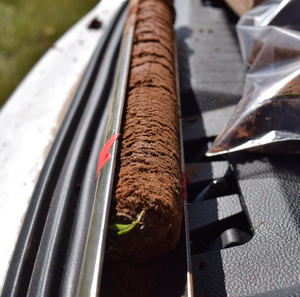Yesterday was World Soil Day and—even though we’re thinking about soil every day here at EPIC—we are thrilled that the importance of soil health in the battle to reverse climate change is being recognized on a global level. Farming practices are a key factor in the overall health of our earth’s soil, which is why regenerative agriculture is so important. Holistic management of animals can increase the soil’s ability to sequester carbon and retain water. Along with our suppliers and partners, we are excited to share new data that illustrates the positive impact regenerative practices can have on the planet and communities, while providing as much transparency as possible along this journey.

Conventional Rancher Goes Rogue
White Oak Pastures, one of our key suppliers, is a prime example of how regenerative practices have measurable impacts on the soil. Will Harris took over the family ranch in 1976 after graduating from the University of Georgia. He farmed industrially for over 20 years—just as he had been taught by his father. However, in 1995, he began a dramatic transition to holistic land management. Seeking a more intimate appreciation of Nature, he rejected the chemicals and commoditization involved with factory farmed meat. Instead, he sought to restore ecological harmony to the land while maximizing yield and animals.
“From a farm operation perspective, I saw that my monoculture of cattle would not work without pesticides, unnatural feedstuffs, chemical fertilizers, antibiotics, and the other production crutches that I had come to be dependent upon,” explains Will. “I had to put other animal species onto my pastures to make things work properly.”
Besides adding a variety of animals to his farm, Will took on debt for the first time to build a processing plant and other support facilities. He was making a comfortable, dependable income as a conventional farmer, so the transition was not an easy one. However, the payoff for Will’s commitment and efforts was beyond what he could have imagined. Will’s rejection of conventional farming was revolutionary, and he has since become one of the United States’ leading producers of grass-fed beef, pastured pork, and pastured chicken, simultaneously rejuvenating his red Georgia clay into rich topsoil.

New Study Sheds Light On The Power of Regenerative Practices
With the support of our parent company General Mills, we conducted a life cycle assessment (LCA) that evaluated the carbon footprint of White Oak Pastures. The analysis suggests that activities at White Oak—including restoring degraded cropland to perennial pastures, regenerative farming practices like multi-species holistic planned grazing, and applying compost—have sequestered a substantial amount of carbon over time. The assessment also validated significant improvement in microbial activity, aggregate stability, nutrient profiles, and water permeability.
White Oak, which has been managed holistically for the past 20 years, now contains 5% organic matter, a significant increase from its 1% baseline. Conventionally farmed fields that Will started managing earlier this year still have 1% organic matter or less. By converting previously degraded cropland to pasture and using regenerative farming practices like those used at White Oak Pastures, other farms could experience similar increases in soil carbon sequestration and water retention.
Reviving a Rural Economy
The benefits of White Oak’s transition to holistic management goes far beyond the numbers proved by the LCA. Over the last decade, the staff has grown from four employees to 140, which has caused an influx of people to the town of Bluffton, Georgia where the ranch is located. The employees make twice the county average, and, thanks to White Oak’s operational growth, the economy of Bluffton is the strongest it’s been in a century. “We practice regenerative land stewardship, we practice humane animal stockmanship, and we lead a rural revival,” says Will.

Bringing Regenerative from Farm to Consumer
Since 2015, White Oak has been one of only 23 Global Savory Hubs that are part of the Savory Institute’s Land to Market Program. This means that Will is committed to training other farmers in his ecoregion to adopt regenerative grazing practices. As a Savory Hub, White Oak is helping to build evidence that animal integration significantly contributes to carbon sequestration.
White Oak Pastures is also the first US producer to receive Savory’s Ecological Outcomes Verification (EOV) and is currently the sole supplier for our EOV-labeled beef bites, the first product to carry this seal. EOV is an outcome-based verification that measures soil health, ecosystem diversity, and ecosystem function on producers’ land. The seal indicates to consumers that the product was sourced from farmers that are regenerating the land.
“It’s important for all of us who dwell on earth to set about the business of regenerating the land and the water,” says Will. “The only way that’s going to be done is if farmers start to farm the land in a regenerative matter, and farmers cannot afford to do that unless consumers support it. We need what we’ve done at White Oak to be replicated many times—and for that to happen, consumers must choose products that are grown regeneratively.”
The Land to Market program is helping to spread principles and practices of holistic grazing management and an outcomes-focused approach. Furthermore, the EOV seal makes it easier for consumers to choose regeneratively sourced products—empowering them to vote for land restoration with their purchasing dollars.

Growing the Grass-Fed Bison Herd
As a growing company, EPIC has also contributed to positive impact on animal supply chains. For example, the percentage grass-fed bison in the US has grown considerably over the past few years. By making grass-fed bison more readily available to consumers, we’re able to support more suppliers who raise these beautiful animals completely on pasture as Nature intended.
“With the growing recognition of paleo diets as a key for a healthy lifestyle, energy bars like EPIC are bringing all bison into the reach of more consumers,” says Dave Carter, Executive Director of the National Bison Association. “This is providing economic support for ranchers committed to regenerative agricultural practices.”

EPIC Honesty Pledge
As we continue to improve sourcing and supply chains through our efforts and your support, we also prioritize transparency. We realize there’s always room for improvement and want you—our customers and supporters—to feel connected to the food you eat. This is why we created the Honesty Pledge, an actively updated page on our website that provides insight into each of the animal proteins we source.
It outlines both the current state of our supply chain and our future goals. For example, all of our beef is currently 100% grass-fed. It’s also GAP Step 4 or above—with the exception of traditional jerky, which is an opportunity for improvement. Furthermore, we want to eventually transition fully to regenerative beef protein—like that raised on White Oak Pastures—ensuring all suppliers are measuring outcomes of positive impact on the soil and environment.
These opportunities are examples of why we continue to support ranchers who manage their land regeneratively as well as seek out new suppliers who are interested in business opportunities through transitioning to a more holistic model. By creating desirable market opportunities for suppliers who share our values, we can support positive land impact and sustainable economic health for these farmers.
Through transparency and honesty, we hope to foster a healthy community that feels connected to the food and land that sustains us. This is also why we prioritize content like the Impact Journal and Meatcast—to give you an inside look into our business and values. We want as many people as possible to join us in the food revolution, and we hope our voice helps inspire others to demand better practices in the food industry and agriculture.

Regenerative agriculture is a key tool for restoring the soil and reversing climate change, and we will continue to support ranchers who practice holistic land management. Our investments in partnerships in the regenerative agriculture space represent a radical departure from the commodity-based approach for sourcing packaged food products. The results from the LCA on White Oak Pastures demonstrate that ranchers are key players in fighting soil degeneration and climate change.
We are proud to offer delicious, nourishing products that are also contributing to positive impact on the land. Without your support, these milestones wouldn’t be possible. Just like the earth’s ecosystem, nothing exists in isolation. Thank you for considering the impact that your purchases have on the planet. We are excited to share many more exciting outcomes and initiatives as we continue on this journey.



